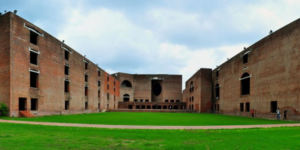Lack of Political Will, Not Grains, Is Why We Do Not Have Universal PDS
Shambhavi Sharma and Sourya Majumder
Some states have started responding to the Supreme Court’s directions on ensuring food security, cash transfers and transportation for migrant workers. It is time the Union government steps up.
In a suo moto hearing on May 13, the Supreme Court observed that migrant workers have once again been left in dire straits. The bench directed the Union, and state governments of Delhi, Haryana and UP, to provide income support, transportation and food rations without local ID cards. Since then, chief minister Kejriwal has promised food for Delhi’s distressed populace while Karnataka is considering a relief package to the unorganised sector welfare boards.
The petitioners in the Supreme Court have asked that PDS be extended to migrant workers under the Atmanirbhar Bharat scheme. While applauding civil society organisations for stepping in, the Union government is yet to comply with the court’s directive.
On Monday, the court noted the slow progress made in creating a National Database for Unorganised Workers (NDUW), further directing that migrant workers across the country be registered on this portal for receiving benefits and penal action be initiated against employers and contractors who failed to provide details. The top court had directed the Union labour ministry to update the NDUW in 2018.
Ground realities
The 1.14 crore migrant workers who walked home last year, with scattered incidents of riots and resistance, had forced media attention onto themselves. But a more subterranean crisis lurks among India’s undocumented migrant workforce this time. Unlike March 2020, there is been no central directive restricting movement under the Epidemic Diseases Act. However, states have put in place staggered restrictions, starting with night curfews and weekend lockdowns, and now extending them on a fortnightly basis.
Reportedly, 23 crore more Indians have been pushed into poverty over the last year and 75 lakh lost their jobs this April. Lack of food and affordable urban housing, exacerbated by job losses, have kicked off another migrant exodus. CSOs running COVID-19 relief operations wrote to the Delhi government, on May 10, that over 15,000 SOS calls related to food scarcity had been received from 40 locations in the capital alone. (The authors are associated with Migrant Workers Solidarity Network, a signatory to this letter.)
The Pradhan Mantri Garib Kalyan Anna Yojana (PMGKAY), an emergency food scheme started last year, has been reintroduced. Experience shows that PMGKAY was insufficient in providing for the crores of migrant workers who do not possess a ration card in their destination states. Even schemes promised to locals, such as in Maharashtra and Delhi, are yet to take off. While the governments of Tamil Nadu and Kerala have assured that migrant workers will be provided for, the exodus reported from there indicates that it may have been too late and too little.
Supply-side constraints?
In an interview with Business Standard, Bishow Parajuli, UN World Food Programme’s director in India, spoke against universalising PDS.
It would unduly benefit too many, Parajuli argued. This merits scrutiny.
Last year, the Union government’s Atmanirbhar Bharat package had covered eight crore migrant workers who do not have PDS cards in their place of work. However, the hastily announced scheme, with little coordination with state governments and no real mapping of migrant workers, did not reach the majority. Estimates from the Ministry of Food and PDS reveal that a mere 33% of the eight lakh tonnes of grain (wheat and rice) and 56% of 29,132 tonnes of gram were actually disbursed under the Atmanirbhar package.
While the migrant crisis was at its peak last year, buffer stocks were left to rot in the Food Corporation of India’s silos. As of April 2021, FCI had 3.5 times (or 5.62 crore tonnes) more food stocks than its fixed buffer norms. Food stocks are expected to increase to around 8.5 crore tonnes by July – two crore tonnes more than the highest PDS allocated annually in the last five years (6.59 crore tonnes). Meanwhile, a little under three-fourth of Indians are formally enrolled for Targeted PDS. This includes migrant workers who may not actually be availing rations away from where they are registered. Commentators have also projected that, as it stands, the PDS excludes an additional 12.2 crore Indians who became eligible after the 2011 Census, which PDS is based on. Too few Indians have been covered by PDS in the best of times, not too many, as Parajuli worries.
Back-of-the-envelope calculations show that FCI’s current excess capacity can supply a monthly grain basket four times larger than existing PDS norms, that is 20 kilograms of food grain per head, for the next eight months to the excluded 10.8 crore Indians. The entitlements basket can be further refined to diversify nutritional content, such as by including eggs, and moving PDS beyond food grains to cover basic medical and sanitation needs.
PDS is political
Concerns have also been flagged over the problem of false beneficiaries. End-to-end computerisation and better targeting have been devised to eliminate the ‘creamy layer’ drawing subsidised grains, pilfering contractors and duplication of beneficiaries. The problem is deliberately being misconstrued.
Field observations from Karnataka and Tamil Nadu show that technological fixes, lacking political will, are as likely to allow pilferage in the initial stages of the supply chain. In fact, Aadhaar-seeded biometric authentication has created newer exclusions. Tamil Nadu and Chhattisgarh, with near-universal PDS coverage, have the least leakages. Here the rich ‘self-exclude’ themselves—they do not want to line up for ration even without a pandemic.
The question is not of capacity but of intent. Can the Union government exercise its sovereignty in extending food subsidies to states during a historic crisis despite an enlarged fiscal deficit? This is a practice punished by international finance through agencies such as the World Trade Organization.
Last year’s exodus cautioned us against the deep-rooted effects that lockdown induced economic crisis can have on the majority of India’s working population. It is this majority that makes the nation, yet are no one’s subjects – most interstate migrant workers cannot return to home to vote and are not catered to by governments in their destination states who can win elections without them. This is also the argument for giving them postal ballots. Therefore, the Union government cannot wash its hands off migrant workers. PDS must be universalised, with both destination states and the Union picking up the tab.
(Shambhavi Sharma and Sourya Majumder are associated with Migrant Workers Solidarity Network. Courtesy: The Wire.)
❈ ❈ ❈
Press Statement, May 23, 2021
Instead of Export, Foodgrains Must be Used for Ensuring Food Security of Indians
Right to Food Campaign
As the surge of Covid-19 continues and spreads to rural areas, along with lockdowns in most parts of the country, we are once again witnessing severe economic distress amongst people, especially informal sector workers in both urban and rural areas. The situation is even worse this time, compared to last year, as the burden of healthcare expenses is also high, many more people are dealing with illness in the household and this has come at the back of a year of slowdown, job loss and declining wages. The livelihood and food security crisis facing the poor and informal sector workers across the country has been completely invisibilised with hardly any special packages being announced towards supporting them in this time of crisis. While on the one hand the Pradhan Mantri Garib Kalyan Yojana (PMGKAY) has been announced covering only those who are already included under the National Food Security Act (NFSA) and that too for only two months (May and June), the government’s apathy towards people has been thoroughly exposed by the fact that this year has seen record exports of foodgrains.
News reports indicate that 13.09 mt non-basmati rice, 4.63 mt basmati rice and 2.09 mt wheat was exported in 2020-21, a year when millions of Indians faced a situation of hunger and food insecurity, reducing the quantity and quality of food they consumed. Had these exports been used for distribution among people through the PDS, over 25 crore people could have been given 5 kg a month for a whole year (excluding the basmati rice)! Based on the data given by Harish Damodaran in the Indian Express, 13.09 mt of non-basmati rice was exported for Rs 35,448.24 crore, therefore at the rate of about Rs. 27 per kg, which is even lower than the FCI’s economic cost of rice (currently around Rs. 37/kg). The Right to Food campaign condemns such export of foodgrain when the people of the country are facing acute shortage of food.
It is further appalling, that there is yet no announcement for universalisation of the PDS and extension of the PMGKAY for a longer period even as it is becoming clear that the pandemic and its effects are going to last for some time. The foodgrain stocks in the FCI godowns are once again at a record high of over 100 million tonnes (including rice, wheat, unmilled paddy and millets). It is becoming quite apparent that the government does not care about filling the stomachs of the hungry in the country, and is happy to rather export the grains or use them for other purposes (like it was done for ethanol production last year).
It is because of the system of public procurement and MSP that today there is sufficient production of foodgrains that can be used for maintaining food security for all even in such times of crisis. For this, we have to thank the farmers of this country and join them in their struggle against the new farm laws and for strengthening this system of public procurement. On the other hand, the government’s policies which are on the one hand threatening to take away this minimum support from the farmers, while on the other refusing to come forward to ensure the right to food for all must be resisted.
We demand an immediate universalization of the PDS and distribution of additional 5 kg of foodgrains per person and 1.5 kg of pulses and 800 gm cooking oil under the PDS with its expansion (while enhancing Pradhan Mantri Garib Kalyan Anna Yojana). This should be continued for a period of at least six months.
[Gangaram Paikra, Aysha, Kavita Srivastava, Dipa Sinha, Anuradha Talwar, Mukta Srivastava, Amrita Johri (On behalf of the Steering Committee of Right to Food Campaign)]




